The Blockchain Identity Management Market is estimated to be valued at USD 7.6 billion in 2025 and is projected to reach USD 438.5 billion by 2035, registering a compound annual growth rate (CAGR) of 50.0% over the forecast period.
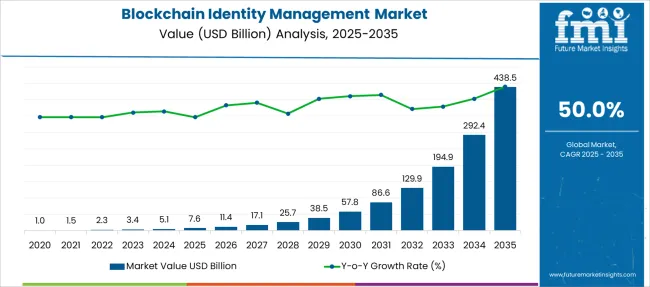
| Metric | Value |
|---|---|
| Blockchain Identity Management Market Estimated Value in (2025 E) | USD 7.6 billion |
| Blockchain Identity Management Market Forecast Value in (2035 F) | USD 438.5 billion |
| Forecast CAGR (2025 to 2035) | 50.0% |
The Blockchain Identity Management market is gaining traction as industries seek secure, transparent, and decentralized solutions for digital identity verification and data management. Adoption is being driven by increased cybersecurity threats, regulatory pressure around data privacy, and the need for tamper-proof authentication systems. Traditional identity systems have often lacked resilience against breaches and fraud, leading organizations and governments to explore blockchain as a secure alternative.
The ability of blockchain platforms to offer immutable records and distributed trust frameworks has elevated their relevance in sectors such as finance, healthcare, and public services. Furthermore, the integration of smart contracts and biometric tools into blockchain networks has expanded their functionality, enabling real-time, automated identity workflows.
Rising digital transformation efforts, alongside heightened user demand for self-sovereign identity, continue to accelerate investment in blockchain identity management solutions. The market is expected to witness sustained growth as global standards evolve and interoperability across platforms improves, enabling broader implementation across critical identity ecosystems..
The market is segmented by Offering, Provider Type, Network, Enterprise Size, and Industry Vertical and region. By Offering, the market is divided into Software and Service. In terms of Provider Type, the market is classified into Application provider, Middleware provider, and Infrastructure provider.
Based on Network, the market is segmented into Permissioned and Permissionless. By Enterprise Size, the market is divided into Large enterprises and Small and medium-sized enterprises. By Industry Vertical, the market is segmented into BFSI, Retail & e-commerce, IT & telecommunication, Government & public sector, Healthcare, Manufacturing, Media & entertainment, and Others. Regionally, the market is classified into North America, Latin America, Western Europe, Eastern Europe, Balkan & Baltic Countries, Russia & Belarus, Central Asia, East Asia, South Asia & Pacific, and the Middle East & Africa.
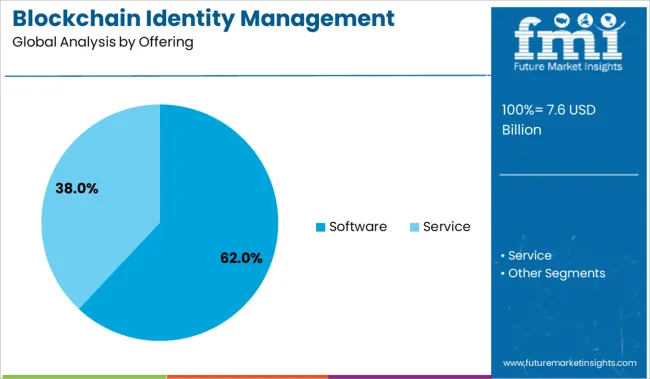
The software segment is projected to hold 62% of the Blockchain Identity Management market revenue share in 2025, making it the dominant offering. This leadership position has been established by the flexibility and scalability that software-based solutions provide to organizations implementing blockchain identity frameworks. Preference has been shown for software tools that support decentralized identity verification, secure credential issuance, and seamless integration with existing enterprise systems.
Enterprises have prioritized solutions that enable self-sovereign identity and user-controlled access, both of which are typically delivered through customizable blockchain software platforms. Additionally, software-centric offerings have been favored due to their cost efficiency, faster deployment timelines, and compatibility with both cloud and on-premise environments.
Continued enhancements in blockchain development environments and growing availability of modular software toolkits have supported broader adoption across both regulated industries and emerging digital ecosystems. These capabilities have ensured that software remains the primary delivery format for blockchain identity applications in the evolving digital identity landscape..
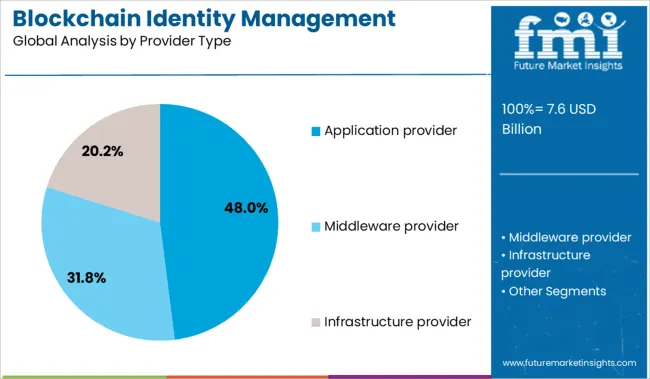
The application provider segment is expected to command 48% of the Blockchain Identity Management market revenue share in 2025, emerging as the leading provider type. The segment’s prominence has been attributed to its ability to deliver specialized identity solutions tailored to industry-specific use cases. Application providers have developed robust platforms for secure authentication, decentralized identifiers, and consent-based data sharing, addressing critical challenges around privacy and interoperability.
These providers have been instrumental in deploying full-stack blockchain identity solutions, integrating front-end user interfaces with back-end distributed ledger technologies. The ability to offer pre-built, regulation-compliant applications has accelerated adoption across enterprises seeking rapid implementation without extensive internal development.
Application providers have also maintained strategic collaborations with blockchain protocol developers, enabling feature-rich products with continuous innovation. As market demand grows for agile, scalable identity systems, application providers are expected to remain pivotal in delivering value-driven, blockchain-enabled identity management services..
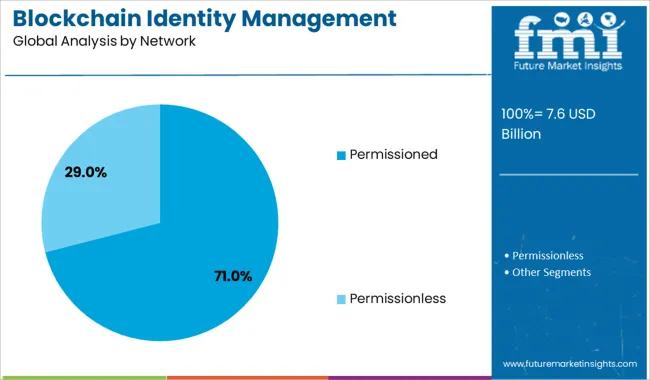
The permissioned network segment is anticipated to represent 71% of the Blockchain Identity Management market revenue share in 2025, securing its status as the leading network type. The widespread adoption of permissioned blockchain frameworks has been driven by their ability to balance decentralization with access control and compliance. Enterprises and governments have demonstrated strong preference for permissioned networks, which allow them to define participant roles, enforce data governance policies, and ensure accountability across transactions.
These networks offer enhanced privacy, higher throughput, and greater regulatory alignment compared to public alternatives, making them suitable for handling sensitive identity-related information. The segment’s growth has been further supported by advancements in enterprise-grade blockchain platforms that offer secure, scalable infrastructure for permissioned deployments.
Integration with digital ID ecosystems, such as national identity programs and healthcare records, has reinforced the trust and control enabled by permissioned systems. As secure identity verification continues to gain strategic importance, permissioned networks are projected to retain a leading role in the architecture of blockchain identity solutions..
Rising identity fraud and regulatory compliance are driving global demand for decentralized, tamper-proof blockchain identity systems. Cross-sector use cases and consortium-led initiatives are accelerating adoption, interoperability, and large-scale deployment of blockchain-based digital IDs.
The growing global incidence of identity theft, data breaches, and unauthorized access is fueling demand for secure identity solutions. Blockchain’s inherent features such as immutability, encryption, and distributed validation enable tamper-proof digital identities that are difficult to forge or manipulate. Enterprises across banking, healthcare, and government are shifting from centralized databases to decentralized ID frameworks to enhance user control and transparency. The rising digital footprint of individuals, coupled with increased online transactions, creates urgency for systems that eliminate intermediaries while ensuring authenticity. Moreover, stringent regulatory frameworks such as GDPR and eIDAS across regions are reinforcing the adoption of blockchain-based identity systems as they offer improved traceability, consent management, and compliance capabilities across borders.
Blockchain identity solutions are gaining traction across multiple sectors including education, supply chain, telecom, and travel. Universities are issuing verifiable academic credentials, while airlines and immigration departments are exploring digital IDs for secure passenger onboarding. These use cases demonstrate blockchain’s potential beyond finance. At the same time, several industry consortiums are being formed to standardize protocols, ensure interoperability, and accelerate pilot deployment. Collaborative initiatives such as Sovrin Foundation, Hyperledger Indy, and ID2020 are enabling cross-industry integration and creating trust ecosystems. Enterprises view consortium-led approaches as a strategic way to scale adoption without compromising control. The expansion of these partnerships is expected to drive faster commercialization and validation of decentralized identity infrastructure globally.
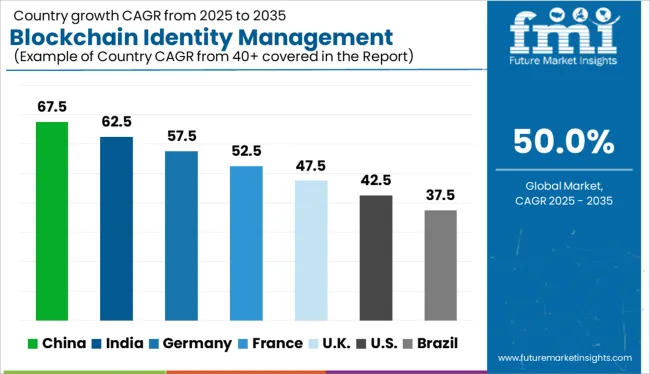
| Country | CAGR |
|---|---|
| India | 62.5% |
| Germany | 57.5% |
| France | 52.5% |
| U.K. | 47.5% |
| U.S. | 42.5% |
| Brazil | 37.5% |
The global blockchain identity management market is projected to grow at an extraordinary CAGR of 50% between 2025 and 2035, fueled by rising cybersecurity threats, increasing demand for decentralized identity verification, and growing adoption across digital government and financial services. Among BRICS nations, China (67.5%) and India (62.5%) are leading this transformation, driven by expansive digital ID initiatives, growing Web3 ecosystems, and government-backed blockchain pilot programs. Their progress significantly outpaces the global average and reinforces their role as pivotal markets for innovation. In the OECD bloc, Germany (57.5%) demonstrates strong uptake, propelled by regulatory support for secure digital identities and enterprise-grade blockchain integration in finance and healthcare. The UK (47.5%) and US (42.5%) remain major contributors but trail the global pace due to legacy system complexities and fragmented regulatory landscapes. ASEAN economies are rapidly emerging as key adopters, leveraging blockchain for cross-border digital identity interoperability, especially across fintech and public administration sectors.
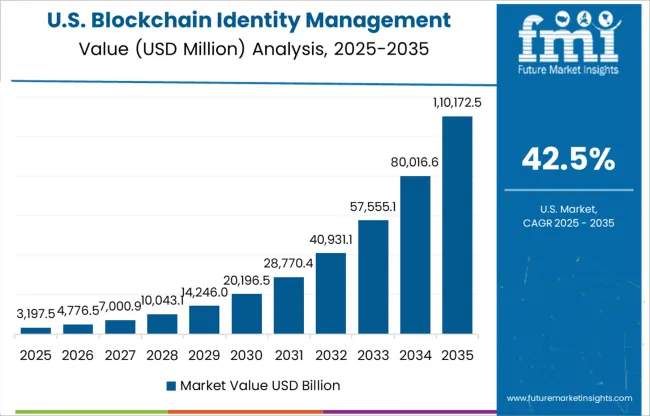
The CAGR of the Blockchain Identity Management Market in the United States was approximately 6.3% from 2020 to 2024. It is expected to rise to 9.8% during 2025 to 2035. This acceleration is driven by expanded adoption in the healthcare and defense sectors. The U.S. Department of Homeland Security increased funding toward digital identity pilot projects. Private sector players, especially in fintech and insurance, have accelerated blockchain-based Know Your Customer (KYC) deployments. Rising concerns around centralized identity data breaches are creating demand for self-sovereign identity frameworks. Major technology firms are integrating decentralized ID wallets into cloud infrastructure and mobile authentication solutions. Regulatory clarity around digital credentials, particularly after 2025, has further boosted enterprise confidence in deploying blockchain verification layers.
The CAGR in the United Kingdom was approximately 4.8% from 2020 to 2024. It is projected to increase to 8.3% for the 2025 to 2035 period. This growth is attributed to enhanced public-private collaboration and stronger regulatory frameworks. The UK Cabinet Office introduced pilot programs for digital identities linked to government services. Integration with NHS and DVLA platforms enabled real-time identity checks for healthcare and licensing. Financial services firms began adopting cross-border blockchain verification systems aligned with GDPR and eIDAS. Decentralized identifiers (DIDs) were adopted within enterprise identity access management frameworks. Increased venture funding and EU-aligned legislation helped accelerate proof-of-concept projects into large-scale rollouts by 2027.
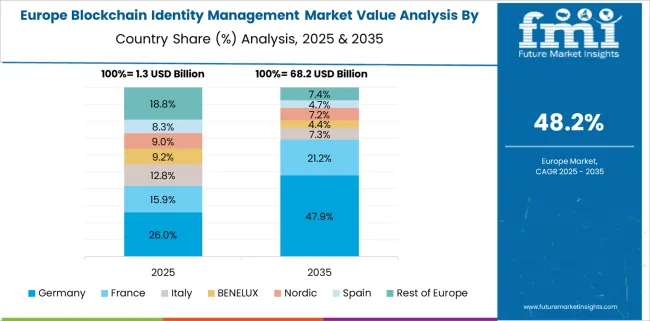
Germany’s CAGR for blockchain identity management was 5.8% during 2020 to 2024. It is expected to rise to 9.6% for the 2025 to 2035 forecast period. Strong institutional adoption and compliance with the EU’s digital identity framework are key drivers. Large enterprises in automotive, manufacturing, and public utilities adopted decentralized ID solutions for workforce management and supply chain verification. Germany’s Data Protection Authority issued blockchain-specific compliance advisories, which accelerated enterprise onboarding. Blockchain ID integration with Smart City and e-Government projects grew rapidly post-2025. State-owned banks started issuing blockchain-based digital identities for loan verification and subsidy eligibility. The tech ecosystem benefited from increased EU R&D funding and pilot innovation grants.
The CAGR in China was 6.8% from 2020 to 2024 and is projected to climb to 12.3% during 2025 to 2035. National-level digitization programs and support from provincial governments are key growth enablers. The Chinese Ministry of Industry and Information Technology promoted blockchain ID for smart manufacturing and trade finance authentication. Municipalities across Beijing, Shenzhen, and Shanghai introduced blockchain identity layers in public housing, legal services, and citizen service portals. State-owned banks deployed decentralized KYC tools for rural microfinance schemes. China’s centralized health code systems began transitioning toward encrypted decentralized formats post-COVID. Strong domestic tech platforms like Alibaba and Tencent have scaled identity solutions across payments, logistics, and travel.
India’s CAGR was 6.3% from 2020 to 2024, and it is forecasted to surge to 11.1% for the 2025 to 2035 period. Growth is supported by digital public infrastructure such as Aadhaar and DigiLocker integrating blockchain-based enhancements. The Ministry of Electronics and IT launched frameworks to enable verifiable credentials and data sovereignty using blockchain. State governments in Maharashtra and Karnataka rolled out pilot projects for land registry and education certificate verification. Fintech startups introduced decentralized identity wallets targeting gig workers and rural populations. Policy alignment with the Data Protection Act and global digital identity standards is attracting foreign direct investment and public-private partnerships in the ID tech space.
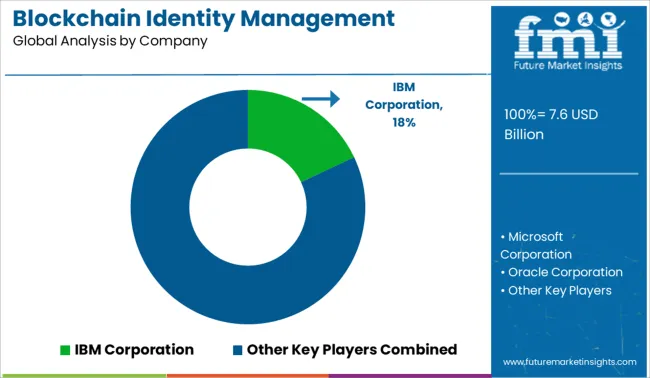
In the blockchain identity management market, top players are focusing on decentralized ID ecosystems, secure credential verification, and interoperable frameworks for cross-sector deployment. IBM Corporation and Microsoft Corporation are integrating blockchain ID into enterprise cloud services and authentication tools. Oracle Corporation offers blockchain-based identity layers for supply chain and HR platforms. Accenture is leading public-private ID pilots across national digital identity programs. Civic Technologies and Evernym are pioneers in self-sovereign identity protocols. Netki enables KYC compliance with blockchain registries for fintechs, while Bitfury supports government-linked digital ID systems. uPort and ShoCard are developing mobile-first identity wallets and credentialing systems designed for privacy, control, and cross-platform usability
In April 2025, Oracle announced the introduction of Privacy-Enhanced Verifiable Credentials on its Blockchain Platform, enabling enhanced self-sovereign identity solutions focused on user privacy and consent.
| Item | Value |
|---|---|
| Quantitative Units | USD 7.6 Billion |
| Offering | Software and Service |
| Provider Type | Application provider, Middleware provider, and Infrastructure provider |
| Network | Permissioned and Permissionless |
| Enterprise Size | Large enterprises and Small and medium-sized enterprises |
| Industry Vertical | BFSI, Retail & e-commerce, IT & telecommunication, Government & public sector, Healthcare, Manufacturing, Media & entertainment, and Others |
| Regions Covered | North America, Europe, Asia-Pacific, Latin America, Middle East & Africa |
| Country Covered | United States, Canada, Germany, France, United Kingdom, China, Japan, India, Brazil, South Africa |
| Key Companies Profiled | IBM Corporation, Microsoft Corporation, Oracle Corporation, Accenture, Civic Technologies, Evernym, Netki, Bitfury, uPort, and ShoCard |
| Additional Attributes | Dollar sales by sector, regional share trends, adoption by government vs. enterprise, wallet penetration rates, protocol interoperability, and vendor share shifts. |
The global blockchain identity management market is estimated to be valued at USD 7.6 billion in 2025.
The market size for the blockchain identity management market is projected to reach USD 438.5 billion by 2035.
The blockchain identity management market is expected to grow at a 50.0% CAGR between 2025 and 2035.
The key product types in blockchain identity management market are software and service.
In terms of provider type, application provider segment to command 48.0% share in the blockchain identity management market in 2025.






Full Research Suite comprises of:
Market outlook & trends analysis
Interviews & case studies
Strategic recommendations
Vendor profiles & capabilities analysis
5-year forecasts
8 regions and 60+ country-level data splits
Market segment data splits
12 months of continuous data updates
DELIVERED AS:
PDF EXCEL ONLINE
Blockchain Interoperability Market Size and Share Forecast Outlook 2025 to 2035
Blockchain Food Traceability Market Size and Share Forecast Outlook 2025 to 2035
Blockchain AI Market Size and Share Forecast Outlook 2025 to 2035
Blockchain Messaging Apps Market Size and Share Forecast Outlook 2025 to 2035
Blockchain in Logistics Market Size and Share Forecast Outlook 2025 to 2035
Blockchain Market Size and Share Forecast Outlook 2025 to 2035
Blockchain in Energy Market Size and Share Forecast Outlook 2025 to 2035
Blockchain in Agriculture and Food Supply Chain Market Size and Share Forecast Outlook 2025 to 2035
Blockchain Technology Market Analysis & Forecast 2025 to 2035, By Solution, Use Case, Enterprise Size, Industry, and Region
Blockchain in Banking Market
Blockchain in Agriculture Market Analysis – Size, Share & Forecast 2024-2034
Managed Blockchain Services Market Size and Share Forecast Outlook 2025 to 2035
Web 3.0 Blockchain Market Report – Growth, Demand & Forecast 2024-2034
Automotive Blockchain Market Size and Share Forecast Outlook 2025 to 2035
Identity Governance and Administration Market Size and Share Forecast Outlook 2025 to 2035
Identity Verification Market Analysis - Size, Share, and Forecast 2025 to 2035
Identity Analytics Market Size and Share Forecast Outlook 2025 to 2035
Identity-as-a-Service (IDaaS) Market Outlook 2025 to 2035 by Access Type, Enterprise Size, Service Type, Application, Industry, and Region
Identity And Access Management As A Service (IAMaaS) Market Size and Share Forecast Outlook 2025 to 2035
Identity & Access Management Market Growth – Demand, Trends & Forecast 2025-2035

Thank you!
You will receive an email from our Business Development Manager. Please be sure to check your SPAM/JUNK folder too.
Chat With
MaRIA